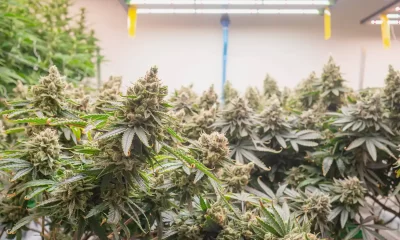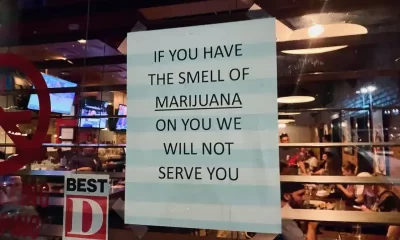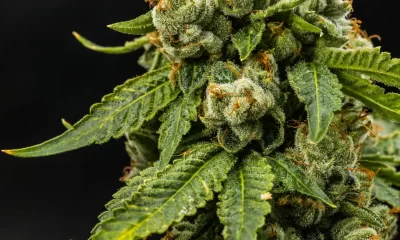Business
Feds Relax Rules Regarding Cannabis Use To Attract Younger Workers

But don’t get too excited. They’re your toxic ex who never really changes.
No one understands how regressive (and…evil) the feds are. Thanks for burning down all of those fields of pretty plants over the years, guys, not to mention the countless lives ruined by the War on Drugs. It doesn’t make up for it, but the federal government is finally relaxing its drug screening rules, The New York Times reports. Why? As the older generations, who were often more sympathetic to Nancy Reagan’s thinking, leave the workforce, the feds must recruit younger workers. And younger workers grew up in a different time, understanding that cannabis is both a medicine and a generally safe way to relax and elevate life (without the aggression that the Boomer’s three-martini lunches bring).
Whether they like it or not, the feds know that polls suggest that more than half of Americans enjoy cannabis and that a majority believe it should be legal. Medical cannabis use is legal in 38 states (and D.C., home of the feds), and recreational weed is allowed in 22 states. Still, in an ever-absurd loop, it remains illegal under federal law.
And let’s be clear. The federal government is not saying that its employees can start using cannabis. So what is changing?
Historically, even being honest that you used cannabis would make you ineligible for many federal jobs. So agencies are scaling back policies regarding any past cannabis use. The New York Times reports that over the past five years, 3,400 new military recruits who failed a drug test on their first day were given a “grace period to try again.” Biden is also expected to stop digging deep into past cannabis use for those applying for security clearances.
And the C.I.A. traditionally told applicants that they should refrain from cannabis for one year before applying. But in April of last year, they shortened that to 90 days. And in 2021, the F.B.I. shortened its abstinence requirement from three years to one. And, ever so graciously (yes, that is sarcasm), the Office of Personnel Management decided to stop viewing folks who used cannabis previously as a security risk, streamlining the security clearance vetting process.
At present, if you want to apply for security clearance, you must confess (detailed, kind of like when you join Scientology, and they make you disclose any dirt) any illegal drug use over the past seven (!) years. Under their new and improved laws, that number would go down to five. Regarding cannabis, applicants only have to disclose any use 90 days before seeking out the job, which at least acknowledges that cannabis presents fewer risks than other drugs (even though cocaine is Schedule II and cannabis is Schedule I, so if we are to believe the feds, blow is safer than puff-puff-pass).
As for military service, the Army waived more than 3,300 recruits who failed a drug test or admitted past drug use between 2018 and 2022. The Army is the most chill — the Navy historically has a zero-tolerance policy for anyone who fails their entry drug test, but they recently started giving recruits a chance to take another piss test after 90 days if they failed the first one. Both the Air Force and The Marine Corps are also offering second chances.
In the post-COVID job market, the feds now have to compete with the private sector, where many folks can work from home and even keep their Sativa vape nearby if they need an energy boost. It appears that the pandemic and resulting economic fallout forced them to pull their heads out of their asses and relax some policies. Let’s hope that one day they realize that even their new “relaxed” policies are as out of touch as satanic panic.
Source: https://hightimes.com/news/feds-relax-rules-regarding-cannabis-use-to-attract-younger-workers/
Business
New Mexico cannabis operator fined, loses license for alleged BioTrack fraud

New Mexico regulators fined a cannabis operator nearly $300,000 and revoked its license after the company allegedly created fake reports in the state’s traceability software.
The New Mexico Cannabis Control Division (CCD) accused marijuana manufacturer and retailer Golden Roots of 11 violations, according to Albuquerque Business First.
Golden Roots operates the The Cannabis Revolution Dispensary.
The majority of the violations are related to the Albuquerque company’s improper use of BioTrack, which has been New Mexico’s track-and-trace vendor since 2015.
The CCD alleges Golden Roots reported marijuana production only two months after it had received its vertically integrated license, according to Albuquerque Business First.
Because cannabis takes longer than two months to be cultivated, the CCD was suspicious of the report.
After inspecting the company’s premises, the CCD alleged Golden Roots reported cultivation, transportation and sales in BioTrack but wasn’t able to provide officers who inspected the site evidence that the operator was cultivating cannabis.
In April, the CCD revoked Golden Roots’ license and issued a $10,000 fine, according to the news outlet.
The company requested a hearing, which the regulator scheduled for Sept. 1.
At the hearing, the CCD testified that the company’s dried-cannabis weights in BioTrack were suspicious because they didn’t seem to accurately reflect how much weight marijuana loses as it dries.
Company employees also poorly accounted for why they were making adjustments in the system of up to 24 pounds of cannabis, making comments such as “bad” or “mistake” in the software, Albuquerque Business First reported.
Golden Roots was fined $298,972.05 – the amount regulators allege the company made selling products that weren’t properly accounted for in BioTrack.
The CCD has been cracking down on cannabis operators accused of selling products procured from out-of-state or not grown legally:
- Regulators alleged in August that Albuquerque dispensary Sawmill Sweet Leaf sold out-of-state products and didn’t have a license for extraction.
- Paradise Exotics Distro lost its license in July after regulators alleged the company sold products made in California.
Golden Roots was the first alleged rulebreaker in New Mexico to be asked to pay a large fine.
Source: https://mjbizdaily.com/new-mexico-cannabis-operator-fined-loses-license-for-alleged-biotrack-fraud/
Business
Marijuana companies suing US attorney general in federal prohibition challenge

Four marijuana companies, including a multistate operator, have filed a lawsuit against U.S. Attorney General Merrick Garland in which they allege the federal MJ prohibition under the Controlled Substances Act is no longer constitutional.
According to the complaint, filed Thursday in U.S. District Court in Massachusetts, retailer Canna Provisions, Treevit delivery service CEO Gyasi Sellers, cultivator Wiseacre Farm and MSO Verano Holdings Corp. are all harmed by “the federal government’s unconstitutional ban on cultivating, manufacturing, distributing, or possessing intrastate marijuana.”
Verano is headquartered in Chicago but has operations in Massachusetts; the other three operators are based in Massachusetts.
The lawsuit seeks a ruling that the “Controlled Substances Act is unconstitutional as applied to the intrastate cultivation, manufacture, possession, and distribution of marijuana pursuant to state law.”
The companies want the case to go before the U.S. Supreme Court.
They hired prominent law firm Boies Schiller Flexner to represent them.
The New York-based firm’s principal is David Boies, whose former clients include Microsoft, former presidential candidate Al Gore and Elizabeth Holmes’ disgraced startup Theranos.
Similar challenges to the federal Controlled Substances Act (CSA) have failed.
One such challenge led to a landmark Supreme Court decision in 2005.
In Gonzalez vs. Raich, the highest court in the United States ruled in a 6-3 decision that the commerce clause of the U.S. Constitution gave Congress the power to outlaw marijuana federally, even though state laws allow the cultivation and sale of cannabis.
In the 18 years since that ruling, 23 states and the District of Columbia have legalized adult-use marijuana and the federal government has allowed a multibillion-dollar cannabis industry to thrive.
Since both Congress and the U.S. Department of Justice, currently headed by Garland, have declined to intervene in state-licensed marijuana markets, the key facts that led to the Supreme Court’s 2005 ruling “no longer apply,” Boies said in a statement Thursday.
“The Supreme Court has since made clear that the federal government lacks the authority to regulate purely intrastate commerce,” Boies said.
“Moreover, the facts on which those precedents are based are no longer true.”
Verano President Darren Weiss said in a statement the company is “prepared to bring this case all the way to the Supreme Court in order to align federal law with how Congress has acted for years.”
While the Biden administration’s push to reschedule marijuana would help solve marijuana operators’ federal tax woes, neither rescheduling nor modest Congressional reforms such as the SAFER Banking Act “solve the fundamental issue,” Weiss added.
“The application of the CSA to lawful state-run cannabis business is an unconstitutional overreach on state sovereignty that has led to decades of harm, failed businesses, lost jobs, and unsafe working conditions.”
Business
Alabama to make another attempt Dec. 1 to award medical cannabis licenses

Alabama regulators are targeting Dec. 1 to award the first batch of medical cannabis business licenses after the agency’s first two attempts were scrapped because of scoring errors and litigation.
The first licenses will be awarded to individual cultivators, delivery providers, processors, dispensaries and state testing labs, according to the Alabama Medical Cannabis Commission (AMCC).
Then, on Dec. 12, the AMCC will award licenses for vertically integrated operations, a designation set primarily for multistate operators.
Licenses are expected to be handed out 28 days after they have been awarded, so MMJ production could begin in early January, according to the Alabama Daily News.
That means MMJ products could be available for patients around early March, an AMCC spokesperson told the media outlet.
Regulators initially awarded 21 business licenses in June, only to void them after applicants alleged inconsistencies with how the applications were scored.
Then, in August, the state awarded 24 different licenses – 19 went to June recipients – only to reverse themselves again and scratch those licenses after spurned applicants filed lawsuits.
A state judge dismissed a lawsuit filed by Chicago-based MSO Verano Holdings Corp., but another lawsuit is pending.
Source: https://mjbizdaily.com/alabama-plans-to-award-medical-cannabis-licenses-dec-1/
-

 Business2 years ago
Business2 years agoPot Odor Does Not Justify Probable Cause for Vehicle Searches, Minnesota Court Affirms
-

 Business2 years ago
Business2 years agoNew Mexico cannabis operator fined, loses license for alleged BioTrack fraud
-

 Business2 years ago
Business2 years agoAlabama to make another attempt Dec. 1 to award medical cannabis licenses
-

 Business2 years ago
Business2 years agoWashington State Pays Out $9.4 Million in Refunds Relating to Drug Convictions
-

 Business2 years ago
Business2 years agoMarijuana companies suing US attorney general in federal prohibition challenge
-

 Business2 years ago
Business2 years agoLegal Marijuana Handed A Nothing Burger From NY State
-

 Business2 years ago
Business2 years agoCan Cannabis Help Seasonal Depression
-

 Blogs2 years ago
Blogs2 years agoCannabis Art Is Flourishing On Etsy













